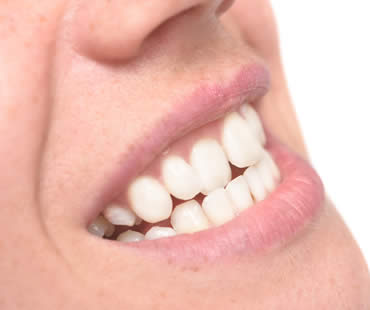
Life can be full of frustrations, demands, deadlines, and inconveniences. For lots of people, stress is a way of life. The problem is that when you’re constantly stressed out, your health can pay the price. There are many health conditions that are caused or worsen due to high stress levels, but did you know that your mouth may be affected in the form of teeth grinding?
What is teeth grinding?
The condition of grinding or gnashing your teeth together is called bruxism, and often includes clenching your jaw. It commonly happens while sleeping, so that you may not even realize you’re doing it. Sometimes a sleeping partner hears it, or your dentist may recognize the signs of unusual wear on your teeth.
What does my stress level have to do with it?
Teeth grinding has been linked to stress and anxiety. Studies have shown that people who are stressed from daily life and don’t have adequate coping methods are more likely to grind their teeth. Experts say that both adults and children facing stress sometimes cope by grinding their teeth.
How does teeth grinding affect me?
Grinding your teeth has more negative effects than you might think. It often causes headaches, earaches, and sleep problems. It can cause chipped, loose, cracked, or sensitive teeth. Tooth enamel can suffer excessive wear, and gum tissue may be damaged. Teeth grinding also often causes a painful jaw disorder of the temporomadibular joint, commonly called TMJ.
What can I do about it?
Your dentist may recommend wearing an over-the-counter or custom mouthguard at night, to protect your teeth from further damage. Medications usually are not helpful, although a muscle relaxant before bed may help prevent jaw clenching. The ideal treatment is to try to reduce or eliminate stress that may be contributing to your teeth grinding. Relaxation therapy, stress management, corrective exercises, and counseling are some of the options that dentists suggest to help you remedy the problem.
If you need a dentist in Fernandina Beach contact us today
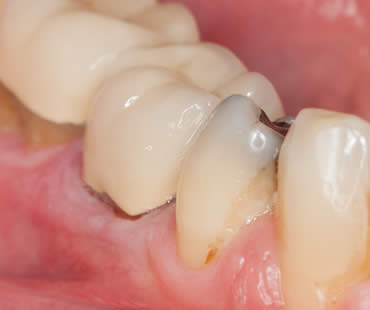
Receding gums not only look unattractive, they can harm your health. If you notice that your gums are receding, ask your dentist for help so that you can reverse the problem instead of allowing it to worsen. The goal is to catch gum recession early and get it under control before it turns into periodontal disease.
What exactly is gum recession? It’s the condition in which the outer tissue on a tooth begins to wear away toward the root, leading to exposure of your tooth enamel and eventually your tooth’s root. If untreated, receding gums lead to periodontal disease. The best way to avoid this problem is to prevent it from starting in the first place. This is easily done by performing good oral hygiene techniques. Brush twice a day with a soft toothbrush using a circular motion and mild pressure. Also, floss your teeth every day.
If you see that your gums are starting to recede, it’s likely that practicing better dental hygiene will restore your gum health over time. A deep cleaning by your dentist will help kick-start your hygiene routine at home. In some cases, an even deeper cleaning called root planing may be necessary.
For more advanced cases of gum recession, your dentist may need to take tissue from other areas and use it to cover exposed roots. This can boost your gum tissue and make it healthy again. If you experience pain and increased sensitivity due to exposed roots, your dentist may prescribe medications to help.
The main thing to remember about receding gums is that quick action is important. Good dental care is key in both preventing it and in correcting the problem after it has begun. If you notice that your gums are pulling away from your teeth or experience sensitivity, start the healing process as soon as possible by asking your dentist for treatment advice.
Our dental office is located in Fernandina Beach
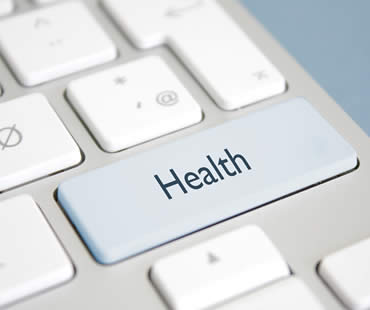
Your body is a little bit like a puzzle. It gives you clues to help you figure out what’s going on within your body. Did you know your mouth can give you hints about things that may be happening elsewhere in your body? Here’s a list of some of the signs your mouth can give you to pay attention to certain other aspects of your health.
Worn teeth and headache
If your teeth are showing extensive wear, you may be grinding your teeth. This would be even a stronger possibility if you’re also experiencing regular headaches, which can be caused by the muscle tension related to teeth grinding. This condition also indicates that you are likely under too much stress, and that you are unconsciously coping with it by grinding your teeth.
Gums covering teeth
If your gums begin to grow over your teeth and you are on medication, it may mean that your medication is at fault. Some medicines can cause your gums to overgrow, and the dosage needs to be adjusted.
Mouth sores
An open sore in your mouth that doesn’t go away in a couple of weeks can be an indicator of oral cancer. Numbness and unexplained bleeding in your mouth are other signs. Smokers and people over age 60 are at the most risk, but that doesn’t mean it doesn’t affect others too. See your dentist to make sure all is okay.
Cracked teeth
If your teeth begin to crack or wear extensively, you may have gastroesophogeal reflux disease (GERD). It’s a digestive disease that allows stomach acid to flow back into your food pipe and mouth. This acid can cause your teeth to deteriorate. Additional signs of GERD are acid reflux, heartburn, and dry mouth.
Unclean dentures
If you wear dentures, make sure you remove and clean them regularly. Inhaling food debris from your dentures that makes its way to your lungs can lead to pneumonia.
We look forward to seeing you in our Fernandina Beach dental office
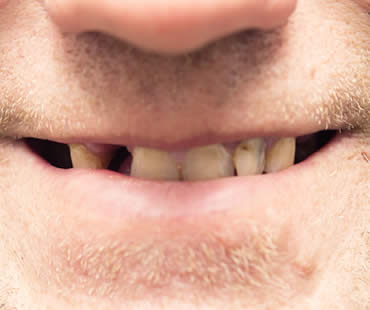
As we age, our birthdays tend to bring new oral health issues along with them. It’s a fact of life that our teeth and gums are impacted by our age. Here are some common problems to watch for, and suggestions for treatment.
Gum disease:
Regular dental checkups and cleanings are vital to avoid gum disease. The first stage is called gingivitis and it’s reversible. If untreated, it can lead to a very serious advanced stage called periodontitis. You may not experience signs of gum disease, so practicing good oral hygiene and seeing your dentist are the best ways to keep it at bay.
Tooth sensitivity:
If cold or hot foods cause you discomfort, you have a common problem called tooth sensitivity. It can result from decay, worn fillings, gum disease, broken teeth, or exposed roots. Your dentist may recommend toothpastes designed to reduce sensitivity, or other treatments based on the cause of your problem. Good oral hygiene can help with sensitivity also.
Missing teeth:
If you are missing any teeth, it not only looks unappealing but it can also affect your ability to eat and speak. Your other teeth may move, and bone loss can occur. Discuss treatment options with your dentist because you might be able to restore your smile. Bridges, implants, and dentures are a few of the dental advances that might help.
Dry mouth:
Medicines and some health conditions often cause your mouth to be overly dry. Having a dry mouth is uncomfortable, but it also can seriously impact your teeth and gums. Without saliva to naturally clean your mouth, the risks of tooth decay and other problems increase. Ask your dentist to look for signs of decay, and to help you identify the cause for your dry mouth. Be sure to tell your dentist about your medical history and medications.
Oral cancer:
Oral cancer can include your gums, lips, cheeks, tongue, jaw, throat, or soft palate. It sometimes begins with just a tiny spot or swollen area, so regular dental checkups can help catch this disease early. A variety of treatment options are available, but early detection makes a difference.
Schedule your appointment at our Fernandina Beach dental office
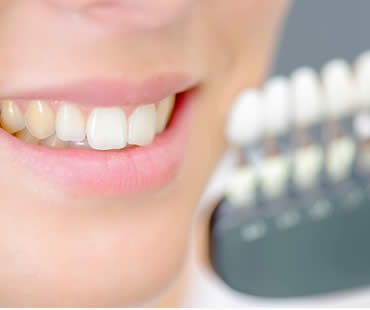
It’s hard to miss with advertisements and visits to the dentist that tartar is something you want to avoid for good oral health. But do you know what this substance is, how to keep from getting it, and what to do if tartar does develop?
What’s so bad about tartar?
Even if you brush and floss regularly, it’s impossible to get rid of all of the bacteria in your mouth. Bacteria and food residue combine to form plaque on your teeth. If left to thrive, plaque attacks your teeth and gums. It causes decay, gum inflammation, and will harden into tartar if not removed before it has the chance.
What does it do to my teeth and gums?
Tartar buildup makes it more difficult to brush and floss well, and tartar along your gums may lead to gum disease. Mild gum disease, or gingivitis, is often caused by plaque and tartar on your teeth. It can usually be reversed with careful dental hygiene. If left untreated, it will progress into periodontitis. This more serious gum disease can damage the bones and tissue that support your teeth, increasing your risk of tooth loss. It may also cause infections that contribute to heart disease and other health problems.
How can I control tartar?
Here are some ways to prevent tartar formation:
- Brush at least twice daily long enough to thoroughly clean every tooth and all of your gums. Consider using an electric toothbrush, which may be more effective for plaque removal.
- Use tartar-control fluoride toothpaste. It is formulated to help prevent tartar formation, and the fluoride can repair damage to your teeth that may have already begun.
- Floss every day to reach the areas that brushing cannot.
- Eat a healthy diet low in sugars and starches, and limit snacks between meals. Drink plenty of water to help rinse away plaque and bacteria.
- Don’t smoke because tobacco use has been shown to increase tartar buildup.
How do I get rid of it?
A professional cleaning is the only way to successfully remove tartar. See your dentist every six months for checkups and cleanings.
Schedule your appointment at our Fernandina Beach dental office
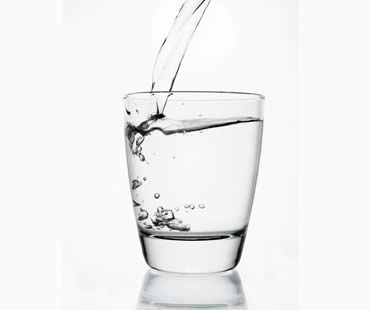
Does your mouth feel like it’s full of cotton? Or does it remind you of the Sahara Desert? Having an overly dry mouth can result from a variety of dental and medical issues. For example, one common culprit of dry mouth symptoms is related to medications. The best long-term solution is to consult your dentist or physician to determine the root cause of your dry mouth, and to get treatment to solve the problem. Sometimes all that is needed is to change to a different medication, and your dry mouth will disappear. However, here are some things you can try to temporarily relieve your dry mouth until you are able to determine what is causing it.
- Sip water often.
- Limit caffeine consumption, which can dry out your mouth even more.
- Chew sugarless gum or suck on sugarless hard candy.
- Use an over-the-counter saliva substitute, such as Biotene.
- Do not use tobacco products of any kind.
- Do not use mouthwashes containing alcohol, because it can be drying.
- Avoid over-the-counter antihistamines and decongestants, which can worsen your dryness symptoms.
- Add moisture to the air using a humidifier.
- Try to breathe through your nose instead of your mouth.
If you do experience the symptoms of dry mouth, it’s especially important to protect your oral health. Make sure you brush your teeth with toothpaste containing fluoride, and ask your dentist if prescription fluoride toothpaste would benefit you. Use a fluoride mouth rinse before bed to add an extra layer of protection for your teeth. Limit the amount of sugary foods or items high in acids, as both of these types of foods increase your risk of tooth decay. Following these tips for relieving dry mouth symptoms can make it more comfortable for you to eat, swallow, and talk.
Our dental office is located in Fernandina Beach







